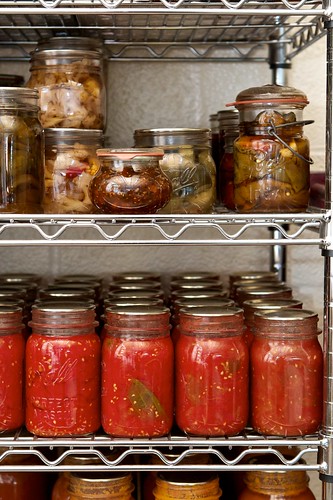
Many people are setting themselves up for failure, because they are storing items that they wont be able to prepare and eat. Say that you store 200 pounds of wheat and had to get it out and use it tonight, would you know what to do? A lot of people would have no idea how to even get started. You may know how to make bread, but you may not have stored all the ingredients to produce it. You may not have realized that you would need yeast, salt, honey, etc. Even if a person had all the necessary items to make bread, they still will be ill prepared, if they did not have a grinder to make the flour. A person, who stores rice, has to cook the rice in water, but have they stored water or do they have the resources to purify water found locally? What about seasoning, herbs, spices, soups, or other items to mix with the rice? A person can only eat so many bowls of unflavored rice!
Basic foods that most preparers store are wheat, rice, beans, dried milk, honey and sugar. In order to make these items pleasing and edible, you will need a lot more things. So if you are one of these people who are storing just the basics, you are falling short of really being ready. So here are a few tips you can use to make a crisis less of a dreary time.
1. Buy a food storage cookbook or visit some food storage websites. You can even do a general internet search, by typing in food storage recipes.
2. Practice cooking with basic stored foods ahead of time. Preparing some recipes now will help you be better prepared later. You also will get you family used to the change in their diet. Make bread by grinding wheat. You can make cereal, by soaking wheat. Fix rice and beans without using any fresh or frozen products. Also use dried milk to cook with. Do all this with the idea that in the time of a serious crisis, grocery stores may no longer be an option.
3. As you test out recipes, you will learn the types of herbs, spices, flavoring, dried or freeze-dried items that you will need. You should store these items just as you would the basic foods.
4. In addition, you will want to store no-essential but desirable condiments, such as ketchup, mustard, mayo, salad dressing, and other items that will make your meal more enjoyable. Other items to add to your food storage should include powder versions of sour cream, eggs, and butter. You can also get cheese and meat in cans or freeze-dried form.
5. Alternate what you store. Wheat and rice may seemingly last forever, but use and replace your herbs spices, soups, and condiments.
6. Purchase your items in smaller quantities because you will only have a certain amount of time before the food isn't fresh anymore. So buying 10 cans of egg whites would not be a good idea, if you are not planning to use them quickly. Freeze-dried fruits and vegetables don't last long once exposed to the humidity. So plan and buy smaller cans, so that your food won't go to waste.
In troubled times a person who is truly ready, will be better off than someone who only stored the basic food items. So stock up you food storage with these tips in mind and remember there is a difference in storing food and actually being ready.
http://survivewhenallelsefails.blogspot.com/
Article Source: http://EzineArticles.com/?expert=Tiffany_Atwood
http://EzineArticles.com/?Dont-Just-Store,-Be-Prepared!&id=7003222